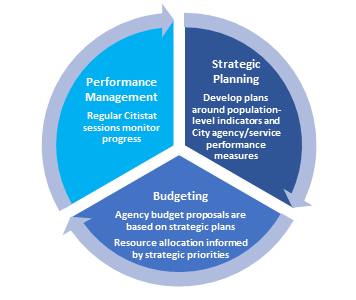Budget Process
In Fiscal 2011, Baltimore implemented Outcome Budgeting. The process required agencies to make service‐level budget proposals that justify investments in strategies geared towards achieving citywide outcomes and goals. Although the process has evolved significantly over the past decade, the underlying principle remains the same: to not only keep Baltimore’s budget sustainably balanced, but also to get the best use of City resources by devoting resources to services that achieve the best results for our residents.
Strategic planning for the budget process is centered on a set of Pillars, which are broadly defined goals for the City. Although these have been modified and adjusted to reflect the priorities of each Mayoral administration, similar themes are common. The budget is built around Mayor Scott's Action Plan and five Pillars: Prioritizing Our Youth, Building Public Safety, Clean and Healthy Communities, Equitable Neighborhood Development, and Responsible Stewardship of City Resources. The Action Plan seeks to operationalize the Mayor's vision for the City of Baltimore and establish measurable goals for residents to assess progress on achieving this vision.
The budget process operates in a cycle that repeats each year: first, develop a strategic plan; next, budget resources in a manner informed by the strategic plan; and finally, track performance against the plan. A more detailed description of the budget process is provided below.

Operating Budget Process
The planning process for Baltimore’s budget begins in August. The major milestones in the operating budget process are described below.
Current Level of Service (CLS)
The budget planning process starts with projections to determine the cost of providing the same level of service in the upcoming year. This projection serves as the baseline for the preliminary budget and assumes that the City will maintain the same level of services, but adds necessary costs, such as extraordinary inflation, or removes prior year one-time costs, such as a new software or study. The CLS budget also includes changes across agencies, such as cost of living adjustments for salaries, negotiated pay increases, or changes in health benefit costs. Based on CLS, BBMR assesses whether the City expects to be operating with a surplus or deficit, which informs strategic planning and guidance for agencies in developing budget proposals.
Agency Budget Proposals
Following the CLS analysis, the Mayor issues budget guidance for City agencies and offices. This guidance is used by agencies to prepare proposals summarizing their performance goals, service level priorities, and funding plans to achieve these goals.
Operating Budget Recommendations
Budget proposals are submitted to BBMR for review and preliminary recommendations. Proposals are evaluated through a set of criteria.
Preliminary Budget
The Mayor utilizes recommendations from BBMR to develop a balanced budget reflecting the Administration's priorities. The Preliminary Budget summarizes major revenues and lays out the proposed spending plan for the upcoming year. The Preliminary Budget is introduced to the Board of Estimates (BOE) for consideration.
Board of Estimates Review
The BOE holds a series of hearings with agencies and residents to understand the recommendations outlined in the Preliminary Budget. Residents offer feedback through their testimony during the annual Taxpayers' Night. The Mayor has the opportunity to propose modifications to the Preliminary Budget based on feedback received during this stage. The BOE compiles its recommendations into the Ordinance of Estimates that is referred to the City Council for consideration.
City Council Review and Approval
Following the introduction of the Ordinance of Estimates, the City Council holds agency hearings and a second Taxpayers' Night. Fiscal 2024 was the first time in 125 years the City Council had the opportunity to amend the budget through transfers across City services with General Fund appropriations. This change was the result of a charter amendment passed by voters in 2020.
Outcome Budgeting in the News
Baltimore’s Outcome Budgeting system became a national best practice and serves as a model for local governments across the country. In Baltimore, Outcome Budgeting led to innovative service delivery mechanisms and a cultural shift within agencies. Greater use of data and evidence during the budget process has improved outcomes for residents in many of the City's priority policy areas. Read the Results for America Case Study: Outcome-Based Budgeting in Baltimore.